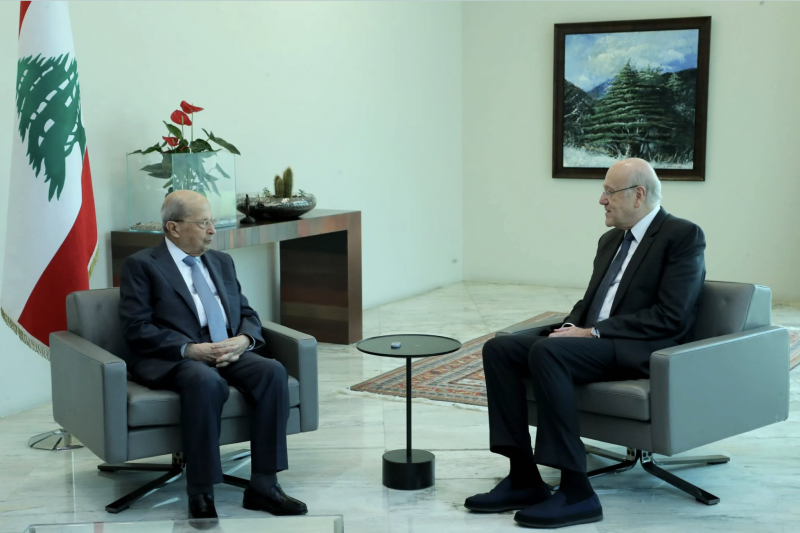
Michel Aoun and Najib Mikati in meet in Baabda, August 31, 2022. (Photo Dalati and Nohra)
President Michel Aoun has made his decision: he will not travel to New York next week to attend the annual session of the United Nations General Assembly— the last before the end of his term.
Instead, Prime Minister-designate Najib Mikati will take his place. The formation of a new government will therefore have to wait until Mikati’s return to Lebanon. Hezbollah is currently leading efforts to unblock the process that has been paralyzed for several weeks.
The party’s efforts intensified over the last two days, notably after the president’s latest verbal escalation.
In a Tuesday interview with the Lebanese daily al-Akhbar, Aoun reaffirmed that a resigning government cannot assume the prerogatives of the president. He said such an action would be a “violation of the Constitution,” and warned he would not remain idle in the face of such “a plot.”
“President Aoun preferred not to travel to New York because it would cost the public treasury a fortune,” a source close to the presidency told L’Orient-Le Jour.
“He does not want to leave the country in such difficult circumstances. He prefers to stay in Lebanon and closely follow extremely sensitive issues, such as the maritime border and the cabinet formation,” the source added.
Another source, also close to the presidential palace, told L’Orient-Le Jour that Mikati will make the trip at his own expense. He is set to fly to New York after the funeral of Queen Elizabeth II, scheduled for Monday in London. Mikati will attend the funeral, representing Lebanon.
This information was confirmed by a source close to the Grand Serail, the headquarters of the Lebanese government. The decision was reportedly the result of consultations between the president and the caretaker premier.
“Najib Mikati is preparing the speech he will deliver in New York,” a source close to the caretaker prime minister said. “He intends to talk about the issue of economic reforms and refugees, as well as collaboration between Beirut and the UN.”
Nothing has changed
Mikati is set to depart Lebanon on Sunday. Prime Minister-designate met with Aoun Thursday morning.
“A meeting at this stage will not change anything regarding the government formation. Both men are digging in their heels,” a source close to the Grand Serail told L’Orient-Le Jour before the meeting.
Aoun insists on enlarging the outgoing cabinet by incorporating six political figures so that it can meet the upcoming deadlines, but Mikati rejected their inclusion.
“We want six political ministers to be included in the outgoing cabinet because it is clear that the current team is unable to manage the complex situation the country is going through today,” said a source close to Aoun.
Mikati does not want the presidential camp, including head of the Free Patriotic Movement Gebran Bassil, to have a say in the composition of a cabinet that could govern the country after the end of Aoun’s term on Oct. 31.
“Najib Mikati considers the [cabinet] lineup he presented to the [Aoun] on June 29 the best solution to overcome the current impasse,” said Ali Darwish, a former Tripoli MP close to Mikati’s entourage.
The possibility of a slight ministerial reshuffle is not off the table. Mikati appeared to be in favor of the president’s suggestion to replace the outgoing Economy Minister, Amin Salam, and the Minister of the Displaced, Issam Sharafeddine.
What about Hezbollah, a long-time ally of Aoun but also the main supporter of Mikati’s reappointment as prime minister?
According to the two top officials’ circles, Hezbollah wants to see the new cabinet established as soon as possible, fearing a security slip due to the poor economic and social situation.
“Hezbollah is continuing its efforts to re-establish communication between the two sides,” said Kassem Kassir, an analyst close to Hezbollah.
Progress made in maritime negotiations, according to the president
President Michel Aoun said Wednesday that progress was made in negotiations on the maritime border demarcation with Israel, but that the technical details are still being “studied in the interest, rights and sovereignty of Lebanon.”
During a meeting with the new Information and Technology Union executive board, Aoun said the demarcation will allow Lebanon to begin the process of “oil and gas exploration, and will give the Lebanese economy a positive impetus to begin to emerge from the economic crisis.”
This remark was made after a brief visit to Lebanon by US envoy Amos Hochstein, mediator for the indirect negotiations between Lebanon and Israel on their common maritime border.
During the visit last Friday, the US envoy met with officials amid heightened tensions between Beirut and Tel Aviv due to the arrival an Israeli floating platform in the Karish gas field.
Two days after Hochstein’s visit, outgoing Foreign Minister Abdallah Bou Habib said the envoy “presented new proposals” during his last trip, without disclosing details.
Before leaving Lebanon, Hochstein said “there is still work to be done,” but “very good progress” was made in reaching an agreement between the two countries.
This story was originally published in French in L’Orient-Le Jour. Translation by Sahar Ghoussoub.